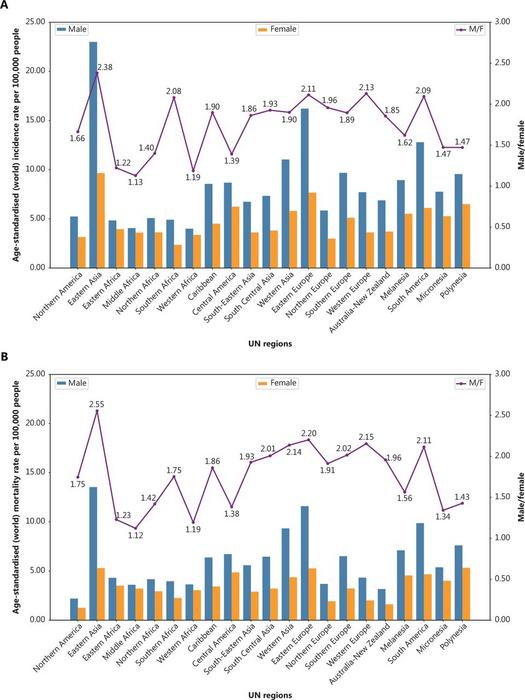A recent global study highlights a concerning trend in the epidemiology of gastric cancer, particularly affecting younger populations—once primarily a disease of the elderly. Researchers from the National Cancer Center in China conducted an extensive analysis of data spanning over 15 years, revealing the urgency of reevaluating and intensifying global health interventions. Findings from this comprehensive study call attention to the alarming rise of early-onset gastric cancer, prompting a serious reconsideration of existing strategies aimed at prevention and treatment.
Traditionally seen as a condition affecting older adults, gastric cancer is now increasingly diagnosed in younger individuals, with evidence suggesting that cases in this demographic may be more aggressive. This shift poses significant challenges for healthcare providers, who are suddenly tasked with addressing a disease that exhibits different characteristics and risk factors in a younger age group. As researchers delve into the factors that may contribute to this trend, they underscore the importance of identifying environmental, genetic, and lifestyle variables that might be driving this change in disease onset.
The research, published in the journal Cancer Biology & Medicine, utilizes global, regional, and national data from 2003 to 2017, sourced primarily from the GLOBOCAN 2022 database and CI5 volumes. The study estimates that there were approximately 968,000 new cases of gastric cancer and 660,000 deaths worldwide just in 2022, highlighting not only the disease’s prevalence but also its growing burden on populations across various regions. East Asia, in particular, stands out as the epicenter of gastric cancer incidence, a point that necessitates specific targeted interventions for these populations.
An interesting finding of the study is the weak correlation discovered between gastric cancer rates and the Human Development Index (HDI). This suggests that even nations classified with high HDI may experience elevated rates of gastric cancer, especially those in Asia. Despite a global decrease in overall incidence rates, the surge in early-onset cases — particularly among younger adults in regions such as Europe, Oceania, and North America — signals a shift in the traditional understanding of gastric cancer epidemiology. Researchers argue that this surge is likely linked to changing lifestyle factors, including dietary patterns and increasing rates of obesity, which compound the risks associated with the disease.
Lead researcher Dr. Wanqing Chen emphasizes that the rise in early-onset gastric cancer is not simply a medical concern; it is a public health crisis that necessitates immediate response and action. Among the recommendations highlighted in the study is the crucial need for developing specific prevention strategies that target younger demographics. This focus would not only raise awareness but could also lead to more timely interventions, ultimately reducing the adverse impact of the disease on younger adults and healthcare systems.
The implications of this research extend beyond individual cases and implications for healthcare providers; they encompass a broader call to action for policymakers and public health officials globally. As younger populations become increasingly affected by gastric cancer, there is a pressing need for systems to recalibrate resources, enhance public awareness campaigns, and steer funding towards specific research initiatives. Educating younger individuals about the risks associated with gastric cancer, alongside promoting healthier lifestyle choices, can help mitigate future cases.
Furthermore, the study’s findings contribute to a growing body of literature highlighting the necessity for ongoing research in the field of cancer epidemiology, with particular attention to age and demographic shifts in disease incidence. A continued emphasis on both prevention and treatment tailored for younger patients will foster a comprehensive approach to eradicating or reducing the impact of early-onset gastric cancer.
As the research community works to unpack the complex interplay of genetics, environment, and lifestyle in relation to gastric cancer, it becomes increasingly clear that this issue is not confined to medical circles alone. Collaborative efforts among researchers, healthcare providers, and community organizations are essential for creating robust frameworks that actively engage and educate younger populations at risk. The hope is that by sharing knowledge and resources, there can be a concerted push towards reversing the concerning trend highlighted by Dr. Chen’s study.
In conclusion, the rise of early-onset gastric cancer is a multifaceted challenge that necessitates immediate attention and a shift in public health strategies. With compelling evidence illustrating the changing demographic landscape of this disease, there remains a prime opportunity for proactive measures to be put into place. Researchers like Dr. Wanqing Chen encourage not only the medical community but also society as a whole to recognize the urgency of the situation and to drive forward solutions that ultimately save lives.
As the world continues to grapple with the implications of early-onset gastric cancer, we stand at a crucial intersection of research, policy, and public health intervention. The findings of this study serve not only as a stark reminder of the evolving nature of cancer but as a rallying call to prioritize the health of future generations.
Subject of Research:
Article Title:
News Publication Date:
Web References:
References:
Image Credits:
Keywords:





